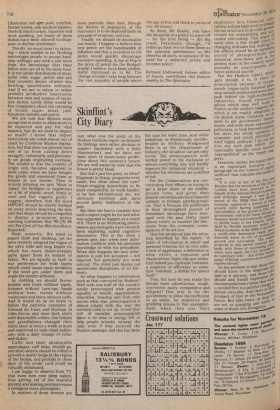Skinflint's City Diary
Just what was the point of the Hudson Institute report on Britain?
Its findings were either obvious or suspect (sprinkled with a little illumination), and we have not been short of doom-laden predictions about this country's future. We are well aware by now that the future is pretty bleak.
But that's just the point, so what? Diagnosis is cheap, prognosis even easier, but what about the cure? Finger-wagging injunctions to be more competitive, to work harder, to be less old-fashioned, etc, are obviously pointless and have proved pretty ineffective in the past.
But then one has to consider who such a report might be for and what was supposed to happen as a result of it. There is an interesting phenomenon psychologists have recently been exploring called cognitive dissonance. This is the state a person gets into when new information conflicts with his previous knowledge or with his prejudices. When that happens the new information is just not accepted – not rejected, but genuinely not even noticed. The mind just blocks out unwelcome disruptions of its harmony.
So what happens to information such as that conveyed by Hudson? Well with one half of the country totally preoccupied with greater equality of wealth, opportunities, education, housing and God only knows what else, preoccupation is almost totally with the way the national cake is cut up. Given that sort of socialist preoccupation there is no time or energy left to help people actually enlarge the cake even if they received the Hudson message, and this has been the case for some time. And while somebody as disastrously muddleheaded as Anthony Wedgwood Benn is at the Department of Industry, the situation can get only worse. His preoccupation with worker power to the exclusion of almost everything else will hardly improve the industrial situation – whether his intentions are justified or not.
Yet the Conservatives are concentrating their efforts on trying to get a larger share of the middleground votes, and given their present uncertain electoral base are unlikely to attempt anything radical. That is because the politicians in their shortsighted pursuit of immediate advantage have managed over the past thirty years almost totally to insulate the electorate from the economic consequences of its actions.
This has produced just the situation described by the report: "A habit of conciliation in social and personal relations for its own sake, a lack of aggression, a deference to what exists, a repeated and characteristic flight into pre-industrial indeed pre-capitalist fantasies, a suspicion of efficiency as somehow 'common', a dislike for labour itself."
True, but how do you make the British more adventurous, tough, innovative, nasty, competitive and diligent? One way is for the government to allow the inefficient to go under, for restrictive and grasping unions to feel unemployment when they put their
cirrhe , Qpectator November 30,1974 employers into financial difficulties, and perhaps even to change the tax structure to provide greater reward for enterprising and suc cessful risk-taking. This might all, work after a few tough years nr changing attitudes but waiting for the effects would be an agonising period of unemployment and industrial slow-down and in the present stale of the country wn stc secnnia iiieA probably be unaccepta. hencepoliticalsuicide. But theludsonreport gentthoughitis,isshortcn prescription anyway. It recon mends longer-term nationalpl ning outsidepoliticsancmore pushbehindthehightechioiE industries. Sound theoreticuththeicEhritisishn not r readily advice which may well work in1 France as the authors suggest, but need to get government departments, and even more importantlY Certainlyilya daP : cloo Certainlyilya daP politicians, to look beyond teatime; but since the whole question °I economic and social priorities is itself highly political, I do not see
hw P o any such plan which t
: cloo
reasonably specific could becorne 'suprapolitical' as the report sug"
gests. ta bv
However, within the report there
is an important footnote to al paragraph on the 'control of capita, outflows' that contains the seeds r cure:" "It is only in one of the five 13051 decades that the resources of the city 0 London have been directed to the in Chhe benefit of the internal British econo and strikingly enough it was itls.d mY. period of the 1930s that the Br d economy registered a period of raPhie growth. After having susp convertibility of the pound inende tthe 1931',1a government restricted loans abroa,-, measure which was eventually soften; to permit loans to the Empire. the Stim lated by flexible monetary policy%ie British economy of the 1930s, even
a world-wide depression vi518.
raged, Orel doxically knew an era of accelerant, growth and innovation. The achieved in this period contrast 00
its customary role – that of the pump' of British capital to more entict regions abroad."
diagn o
41
should listen to the 0 So the problem is that those 0 , deaf to it anyway, and those wthe osis 3r` should and would implement hat irecommendations realise that needed first is a painful w in changBritish attitudes. And there is --tle ,,,ie liet prospect of that in the foreseete future. But take heart, at least "as are not as grasping and oast!' some of those i____ ich follers. Results for November 16
reasonably specific could becorne 'suprapolitical' as the report sug"
politicians, to look beyond teatime; but since the whole question °I economic and social priorities is itself highly political, I do not see
hw P o any such plan which t










































 Previous page
Previous page